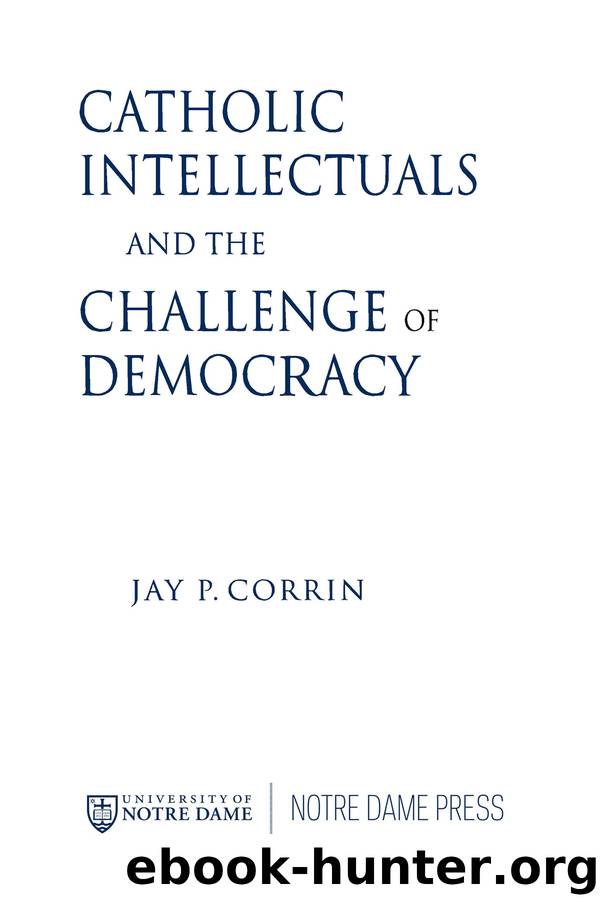Catholic Intellectuals and the Challenge of Democracy by Jay P. Corrin

Author:Jay P. Corrin
Language: eng
Format: epub
Publisher: University of Notre Dame Press
Published: 2002-07-14T16:00:00+00:00
CHAPTER 12
The Religious Crusade in Spain
In fact, to the writer it seems that the whole world is suffering from some kind of psychosis of excess nationalism and deficiency of calm thought, and to him this explains at least in part the cocksureness with which statements are made pro and con on so many questions by both Catholic and non-Catholics. St. Augustine said long ago: “I hold that one never errs more surely than when he errs as the result of an excessive love of truth or an excessive fear of falling into error”
—Virgil Michel1
The outbreak of the Spanish Civil War in July 1936 created a deep moral crisis for European and American Catholics, both in terms of its effect on political consensus within intellectual ranks and in terms of the negative public image it created for the Church.2 The strident American Catholic campaign for Franco and its related attacks on liberalism, for example, earned the Church the dubious distinction of winning second place (ahead of the Ku Klux Klan and Nazi agencies) in the 1937 American Civil Liberties Union’s poll of institutions that most threatened individual freedoms. Beginning in the same year, several notable American and British Protestant theologians and publications became openly critical of the Catholic Church for what appeared to be its international alliance with the forces of Fascism. The journalist Herbert Matthews held that the Spanish Civil War had divided America along religious and political lines for the first and only time in U.S. history.3 Pro-Franco Catholic opinion may have played a decisive role in the Roosevelt administration’s decision to maintain an arms embargo on Spain, thus helping to assure a Nationalist victory.4
After a large anti-monarchist vote in the Spanish municipal election in April 1931, King Alfonso XIII relinquished the throne and transferred power to a provisional government which introduced a republic. The first government of the Second Spanish Republic was made up of a coalition of diverse republican parties and socialists. The regime seems to have had the support of the majority of politically conscious Spaniards.5 In city plazas and on parade grounds, cries of vivas for the Republic and strains of the “Marseillaise” were heard throughout the land. This popular enthusiasm for democracy was encouraging, given Europe’s current drift toward authoritarianism. Those in support of the change in government closely identified it with the legacy of 1789, though, in contrast, Spanish republicans could claim that their king had left peacefully and that the revolutionaries had agreed beforehand to an equitable distribution of power. In actuality, the transition was fraught with tensions and bitter emotions stemming from intense regional aspirations, from industrial and agrarian struggles, and, very significantly, from anger against the Catholic Church, which in the popular mind was associated with the privileges and oppression of the old order. Spain had been dominated by a landed aristocracy and a small cadre of industrialists who assiduously resisted economic and political reform. The fact that the Republic was supported by considerable numbers of peasants and factory workers imbued the ensuing conflict with the tones of class war.
Download
This site does not store any files on its server. We only index and link to content provided by other sites. Please contact the content providers to delete copyright contents if any and email us, we'll remove relevant links or contents immediately.
Resisting Happiness by Matthew Kelly(3341)
The Social Psychology of Inequality by Unknown(3031)
Day by Elie Wiesel(2783)
Designing Your Life by Bill Burnett(2748)
The Giving Tree by Shel Silverstein(2344)
Human Design by Chetan Parkyn(2074)
The Supreme Gift by Paulo Coelho(1979)
Angels of God: The Bible, the Church and the Heavenly Hosts by Mike Aquilina(1969)
Jesus of Nazareth by Joseph Ratzinger(1811)
Hostage to the Devil by Malachi Martin(1803)
Augustine: Conversions to Confessions by Robin Lane Fox(1773)
7 Secrets of Divine Mercy by Vinny Flynn(1746)
Dark Mysteries of the Vatican by H. Paul Jeffers(1723)
The Vatican Pimpernel by Brian Fleming(1703)
St. Thomas Aquinas by G. K. Chesterton(1635)
Saints & Angels by Doreen Virtue(1606)
The Ratline by Philippe Sands(1580)
My Daily Catholic Bible, NABRE by Thigpen Edited by Dr. Paul(1503)
Called to Life by Jacques Philippe(1481)
